
The Lucky Luijk Riots, October 1982
Steven Pemberton
Some people may not know this, but the rooms in the main building, such as M280, begin with an M because the CWI used to be called The Mathematical Centre (and the other rooms are called Z-something because NWO used to be called ZWO).
I think I was 19 when I had my first contact with the Mathematical Centre; it may have been a year later. I was a big fan of MC research and wrote asking for a copy of a technical report; I don't remember which now - it may have been by Dijkstra, but it was more likely one by van Wijgaarden, Meertens, or Grune. To my surprise rather than billing me, they sent it with a note saying that they hoped I would send them a copy of my publications.
In those days I was doing work with the great programming language Algol 68 (largely designed at the MC; when people talk about dereferencing pointers, that is because of the influence of Algol 68, where the term comes from). I was working at Manchester University implementing it on their research computer, the MU5, a computer that had been designed specially to run high-level languages. Consequently, I met lots of MCers at conferences and Summer Schools, and found that I got on with them extremely well. In the Spring of 1982 I got an invitation over the telephone to come and work at the MC for a year, since they needed someone to fill Lambert Meerten's place for the year that he was going to spend in New York, but would I please decide within the week. I decided.
When I first arrived there was a only a single computing department at the MC, around 25 people. I was impressed because there were two stagiairs working for Paul Klint who were implementing something I had recently published in Software Practice and Experience, so I was sure there was a good match between me and MC. (And there was another stagiair around, Frank van Harmelen, who has kept popping up since). By then the MC (as it was still briefly called) had moved into the spanking new buildings we now sit in, far removed from the old school building next to the old Amstel brewery where I am told rats were an eternal problem.
I came originally for a sabbatical year from my University Lecturer's position in the UK, but the MC/CWI first extended my stay for a year, then another two years, and then indefinitely (I had assumed that job extensions were exponential up to that point). Still, I kept the exponent alive, since it wasn't until the 8th year that I decided to stay in Amsterdam.
They were troubled times in those days, and there were frequent riots in Amsterdam. Those of you who know my essay on Dutch spelling1 will know that in my first few weeks in Amsterdam I managed to get myself beaten up by the ME military police, for the heinous crime of being in the same street (where I happened to live) as where they had just chased a bunch of squatters. I also saw the inside of the brand new Academic Hospital the same day.

The Lucky Luijk Riots, October 1982
They were troubled times for computing as well: the Japanese had recently announced huge funding for their National Fifth Generation Computer project, and the rest of the world was in panic: ESPRIT is a result of that panic, for instance. The University in the UK I was lecturer at was economising, and every department had to write a proposal on how they would reduce. My department was the only one that had to write two proposals, one on how it would reduce, and one on how it would expand. The MC too decided to expand its computing from one to three departments (and also later to change its name to show that computing was a part of what it was doing) not long after I arrived.
When I first arrived the MC had essentially one computer, the incredibly powerful DEC VAX/780, one of the first in Europe (and only serial number 38). To give you an idea of just how powerful this machine was (which we had to share between 30 researchers) my current mobile phone is 700 times more powerful!
Available Computing Power per Researcher at MC/CWI, 1960-2008
I've tried to keep this graph up to date over the years. Lambert Meertens created the original version. It represents the amount of computing power available for an average user (Lambert/me) over the years (note logarithmic y axis). The big jump at the end of the 80's was when individual workstations were introduced.
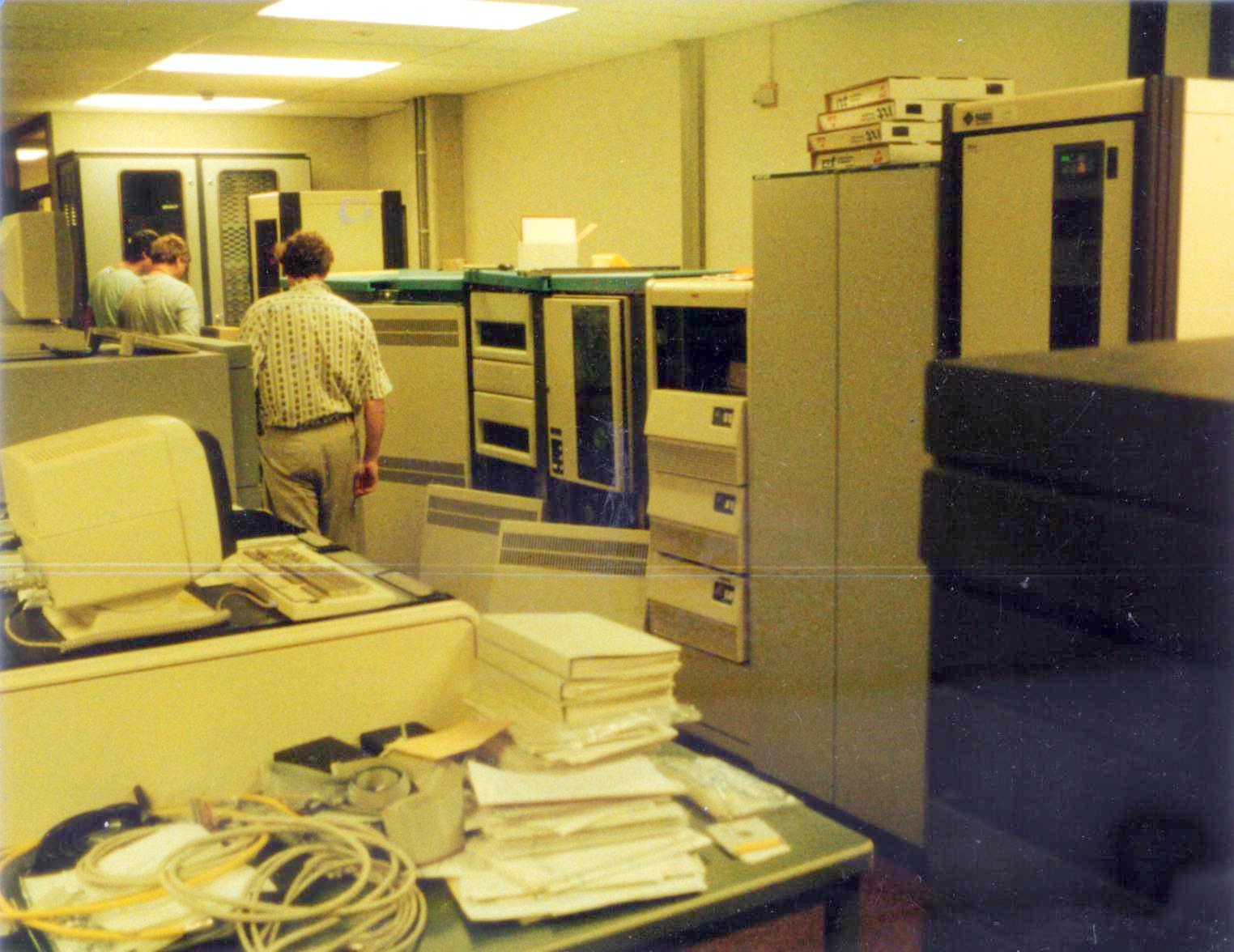
The Vax 11/780, called Boring, being dismantled 22 August
1990
Having only one computer around had some good social effects: there was also a single terminal room, where everyone went who did anything with computers. As a result you got to know every computer user well, and there were lots of discussions and exchange of information. However, since there were so many people using the one computer at the same time, you had to 'type blind'. Typically on a bad day you would type a couple of paragraphs, and then wait for the computer to catch up and display on the screen what you had just typed. It gave lots of opportunities for discussion in the time you were waiting.
It also meant that researchers without families to go home to would do most of their work in the evenings and at night, when you got almost instantaneous response, so the terminal room was quite a gezellig place to be after hours.
In those days there was also a tea and coffee service, where the coffee would be brought round to the offices on a trolley by someone from the cantine, and served up in china cups! A half hour later they would then come and collect the dirty cups. As a result the people who had worked late into the night in the terminal room mostly tried to get into the office for the 10 o'clock morning coffee round. On the other hand, often enough as I raced in to be in time for the coffee round, I would pass someone cycling the other way (usually Lambert), just going home to bed after a long night of programming.
But you have to realise that even with that little amount of computing power the CWI had, we were still way ahead of most other people in the world. There were no serious home computers then, and for many years we had unparalled computing facilities at the CWI. We had a superb typesetting system long before the invention of the laser printer, and we had great networking.
Once we started getting workstations on our desk (1988 for me), the deprivations of the single Vax disappeared, though in recent years the amount spent per employee on computing has dropped dramatically, and nowadays I have a much better computing setup at home than at work, with faster machines, better screens, and more facilities (and that's not to mention the espresso machine). Only the network at CWI is (still) better than what I have at home, but with UPC now offering 120Mbps to the home, even that can't last. If you're interested I have been keeping a graph of my bandwidth at home as well. It looks like I can expect 1Gbps within a decade.
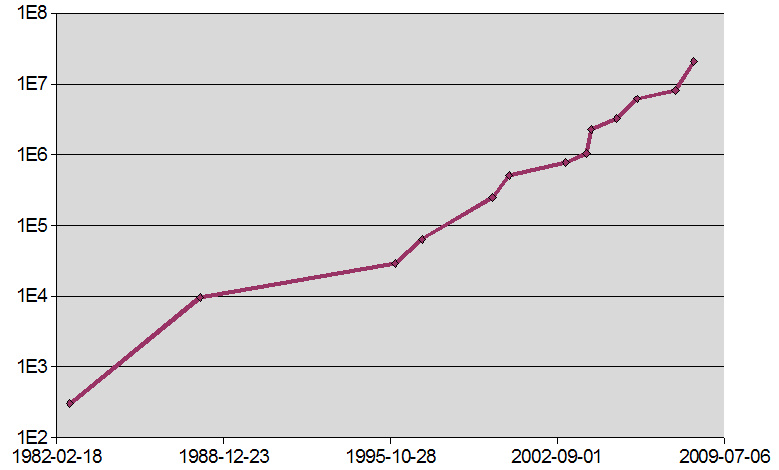
Home Bandwidth 1982-2008
Apart from computing, space has nearly always been at a premium at the CWI. The new building offered a wonderful amount of space for those coming from the old location, but when the original computing department expanded threefold we were in trouble. We created a spoof article for the MC house periodical MC Papier (forerunner of the current CWI Mededelingen) documenting the lack of space, featuring (now-famous) computer scientists working in all sorts of confined spaces: in a box in the corridor, in a cupboard, in the lift, in a toilet stall, on the roof. At least they all had a telephone.
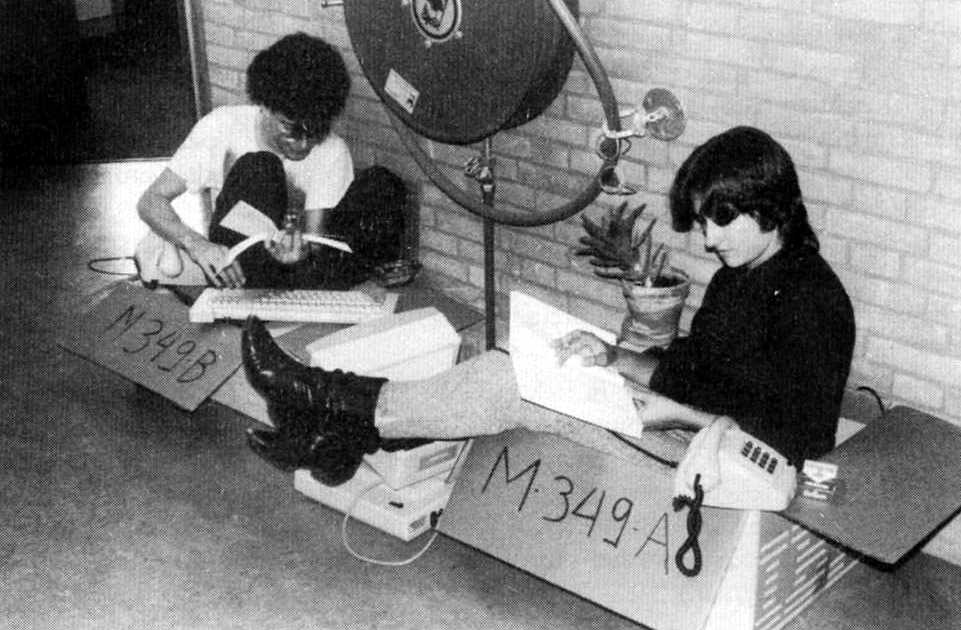
Jack Jansen and Jennifer Steiner in prefab offices
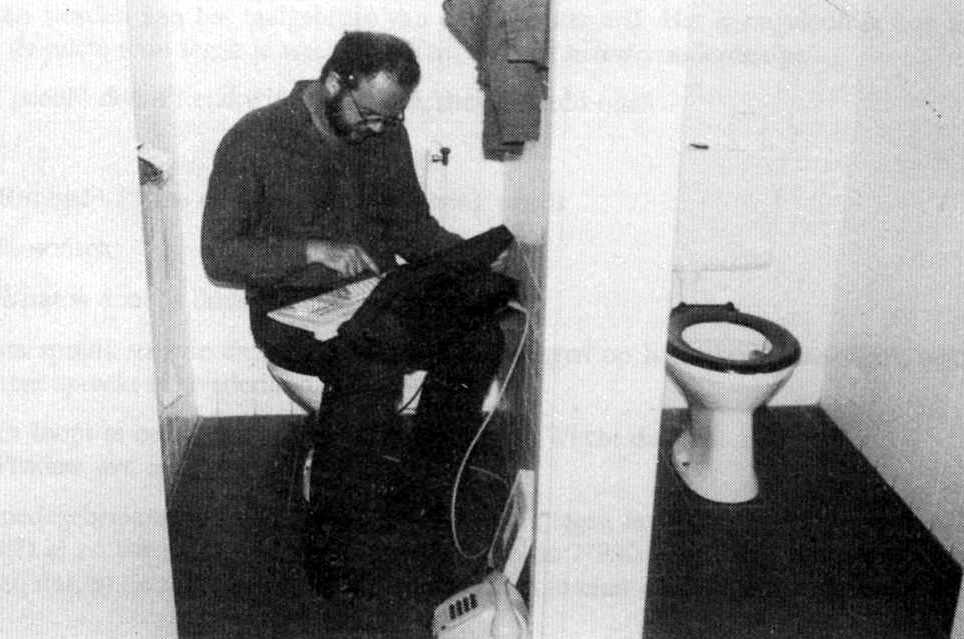
Lambert Meertens in 'Smallest Office'
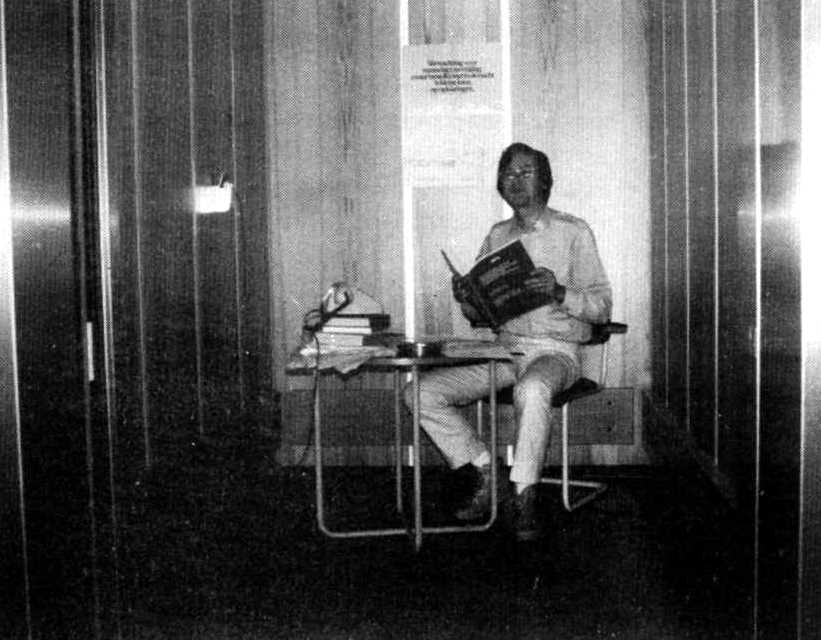
Paul Vitanyi in vertically mobile office
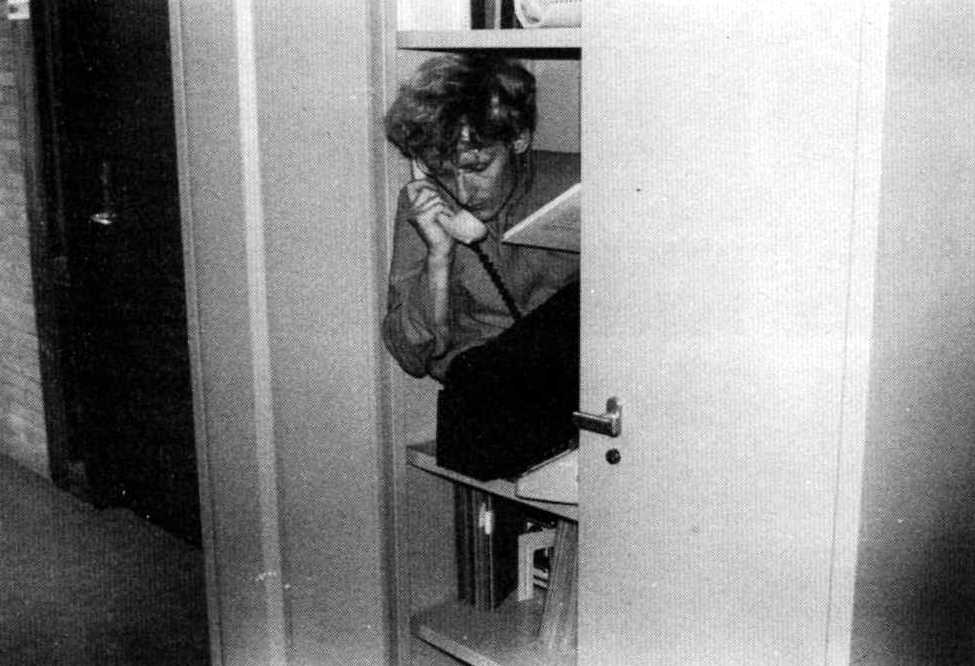
Steven Pemberton in stackable office
I have not known a time since then at the CWI when there hasn't been lack of office space. I predict that when the new building is ready, some country, probably China, will announce another new computing project, and the whole world will panic again...
[1] Look it up with Google. "steven spelling" will do. The person who said "Engelse weer" was Jan Heering as it happens.
© 2009, Steven Pemberton. All rights reserved